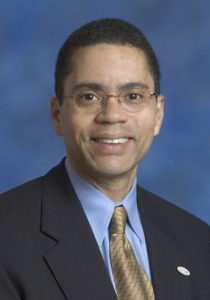
The National Association of Public Hospitals and Health Systems tapped Department of Health Policy professor Bruce Siegel to lead the organization as their chief executive officer Monday.
Siegel will become the first African-American to lead a major hospital association when he assumes his role this fall.
The NAPH is a group of public hospitals based in the District that aims to improve health care by lobbying on Capitol Hill.
“It’s exciting and it’s a little intimidating,” Siegel said. “The only thing I can say is I’m going to do the very best job and I’m going to do it for the patients cared for by these hospitals.”
Siegel, who served as a hospital administrator for public health systems in New York and Florida, said his GW experiences aided his selection for the new position.
“I think it’s sort of in my blood and in the last eight years I’ve been privileged to be at GW and lead a lot of research on these hospitals,” Siegel said.
GW’s Department of Health Policy has made waves in the health care community with its research on minority health care and the creation of a public rating system of health care providers, Siegel said.
“I’ve lead research on how to care for our most vulnerable patients and so my skill set, I think, is a good match for this position,” Siegel said. “The biggest contribution we’ve made to research is that we’ve shown that hospitals and doctors who treat large numbers of minority Americans can really improve the quality of care they provide.”
Chair of the Department of Health Policy Sara Rosenbaum praised his accomplishments at the University.
“Dr. Siegel’s departure is an enormous loss for the University but a major gain for public hospitals everywhere,” Rosenbaum said. “We are immensely proud that one of our faculty members has been chosen to lead this association.”
Outgoing NAPH Executive Director Christine Capito Burch lauded Siegel’s accomplishments and said she was glad to leave the organization under his direction.
“The GW School of Public Health and Health Services has an outstanding reputation,” Burch said in an e-mail. “The work Bruce has done there on the quality of care in our nation’s hospitals is critical work in this era of health reform.”
While Siegel will not remain a research professor, he said he hopes to continue teaching part-time after he assumes his new role.
“The teaching is the thing that I will miss the most,” Siegel said. “I’m hoping to stay on faculty at least as a lecturer so I can continue to do that as much as I can.”




